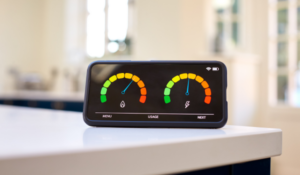
What is the energy price cap and how does it work?
The energy price cap is the maximum price that can be charged by energy providers. It is set by the energy regulator Ofgem and is reviewed every quarter, with the next announcement due in February 2024. The price cap sets a limit on the amount you pay per kWh for both Gas and Electricity, as well as a limit on the daily standing charge. The energy price cap varies depending on the region you live in, so for simplicity, it is usually expressed as an average annual based on a typical dual-fuel household. The current energy price cap is set at £1,928 per year. As the energy price cap figure is based on average usage, the actual amount you will pay for your energy is dependent on the amount you use, so you could pay more or less.
Is now a good time to fix my energy tariff?
While energy prices are predicted to fall in the coming months, there is continued uncertainty surrounding the wholesale energy market due to ongoing disruptions in the Red Sea and the continuing conflicts in Ukraine and the Middle East. It means that energy prices may continue to fluctuate in the coming months, making it difficult to definitively say whether fixing your energy tariff is the best option. If energy prices continue to fall, we would expect to see more competition in the energy market, so could see better fixed-price energy tariffs being offered. Read our article 'Should I fix my energy prices?' for the latest on whether you should consider fixing your tariff.
Tips if you are struggling to afford your energy bills
Even though energy bills are predicted to fall in the coming months, prices right now are expensive due to high energy costs and increased usage over the winter months. If you find yourself struggling to pay your energy bill, we have provided some guidance below:
- Contact your energy supplier - Notify your energy supplier if you are struggling to pay your energy bills. Energy providers are obliged to help you come to a suitable resolution. For example, they may be able to offer an affordable way to repay them, such as a repayment plan.
- Pay your bills via your benefits - If you receive benefits including Universal Credit and Income Support, you may be able to clear any energy debts by paying them directly from your benefits.
- Check for schemes and grants - Contact your energy provider and ask if you are eligible for any of their schemes or grants.
Check out our article 'What to do if you're struggling to pay your energy bills' for more information.
Help if you can't pay your energy bill
Visit the Citizen's Advice website for more information on the help that is available if you are struggling to pay your energy bills. We've also listed some charities and organisations that can provide free financial advice below: